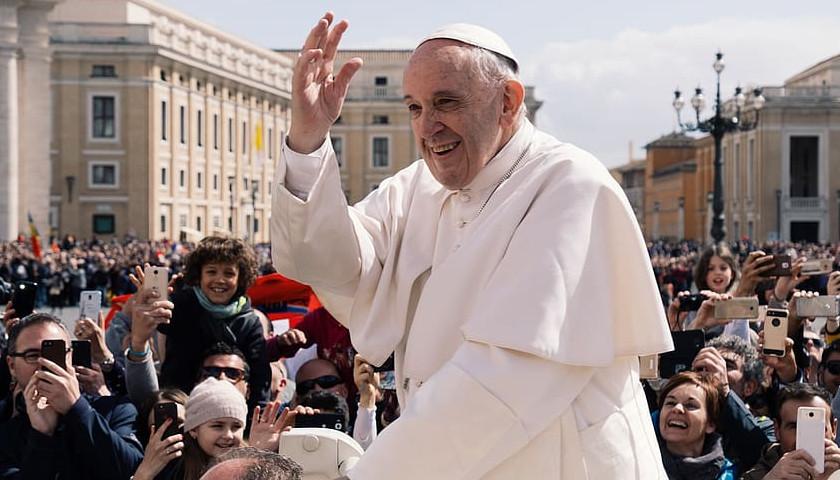by Katrina Trinko
When I saw that Pope Francis would participate as a speaker at the Clinton Global Initiative this month, my heart sank.
Frankly, and I say this as a Catholic, former President Bill Clinton is one of the last people I would like Francis to prominently engage with.
Sure, world leaders (and Francis is one) may sometimes find it worth the downsides to talk to people who aren’t exactly moral paragons. Of course, pastors (and Francis is one, too) should converse with sinners.
But Clinton, while no doubt influential, is not a current world leader. Furthermore, public remarks—as opposed to a private conversation—poses the danger of suggesting papal approval of Clinton, especially given that the remarks will be delivered at an event for Clinton’s own foundation. That’s in marked contrast to the pope’s July meeting with Clinton, which was private, even though photos were released.
As president, Clinton was an avid abortion supporter, even going so far as to twice veto a partial-birth abortion ban. At the time of his second veto, American Catholic cardinals wrote to Clinton, saying, “Your veto of this bill is beyond comprehension for those who hold human life sacred. It will ensure the continued use of the most heinous act to kill a tiny infant just seconds from taking his or her first breath outside the womb.”
While Clinton hasn’t been president for more than two decades, there’s no evidence his views on abortion have changed. In fact, in 2022 when the Supreme Court handed down the Dobbs v. Jackson Women’s Health Organization decision, which overturned Roe v. Wade, Clinton called it a “jarring removal of rights.”
He added, “We all must urge lawmakers at both the state and federal level to pass legislation that will guarantee a woman’s right to choice in her reproductive care.”
Nor is abortion the only issue that puts Clinton at odds with Catholic values. In 1996, Clinton signed the Defense of Marriage Act, which defined marriage as being between a man and a woman. But in 2013, Clinton renounced his own decision, writing in The Washington Post that the Defense of Marriage Act “is itself discriminatory” and “it should be overturned.”
In 1999, while still president, Clinton declared June “Gay and Lesbian Pride Month.”
Francis is slated to speak on “several global topics, including climate change, the refugee crisis, the welfare of children, and the mission and projects of [Rome’s] Bambino Gesu Children’s Hospital” at the Clinton Global Initiative on Monday, according to Vatican News.
Hopefully, that’s not all the pope will discuss. In fact, he can follow in the footsteps of two saints who interacted with Clinton and dared to bring up controversial topics.
In 1993, Pope John Paul II, now deemed a saint by the Catholic Church, met with the then-president in Denver. “Pope John Paul II arrived … [for] his first meeting with President Clinton and immediately emphasized the major subject of disagreement between the two world leaders: abortion,” reported The Washington Post. “John Paul was not shy in reiterating his anti-abortion views,” observed the Los Angeles Times.
With Clinton next to him, John Paul II said, “If you want equal justice for all and true freedom and lasting peace, then, America, defend life.”
“All the great causes that are yours today will have meaning only to the extent that you guarantee the right to life and protect the human person,” the pope added.
A year later, Mother Teresa delivered a speech at the National Prayer Breakfast.
“I feel that the greatest destroyer of peace today is abortion, because it is a war against the child, a direct killing of the innocent child, murder by the mother herself,” she said.
Teresa added, “Any country that accepts abortion is not teaching its people to love, but to use any violence to get what they want. This is why the greatest destroyer of love and peace is abortion.”
Former Reagan speechwriter and Wall Street Journal columnist Peggy Noonan was present at the breakfast at the Hilton Hotel. In a 1998 article for Crisis, she wrote about the Washington, D.C., audience initially receiving Teresa’s words with silence—“cool, deep silence in the cool, round cavern for just about 1.3 seconds.”
But then: “Applause started on the righthand side of the room, and spread, and deepened, and now the room was swept with people applauding, and they would not stop for what I believe was five or six minutes.”
“But not everyone applauded,” Noonan added. “The president and first lady, seated within a few feet of Mother Teresa on the dais, were not applauding. … They looked like seated statues at Madame Tussauds. They glistened in the lights and moved not a muscle, looking at the speaker in a determinedly semi-pleasant way.”
Francis has been a bold defender of Catholic values before, although curiously—or perhaps not so curiously—his words on these topics seem to receive scant attention from the corporate media.
In 2021, Francis told journalists asking about pro-abortion Catholic politicians receiving Communion, “Abortion is more than an issue. Abortion is murder.” Earlier this year, the pope said homosexuality should not be criminalized, but also reiterated, “It is a sin, as is any sexual act outside of marriage.”
Francis also took aim at “gender ideology” this year.
“Gender ideology, today, is one of the most dangerous ideological colonizations,” the pope told the Argentine newspaper La Nación, per the Catholic News Agency. “Why is it dangerous? Because it blurs differences and the value of men and women.”
Francis on Monday has an opportunity, a chance in an event that no doubt American media will widely cover, to make the case for the Catholic values that have fallen so out of fashion among the elites. At a time when a pro-life, Catholic dad can be arrested at gunpoint in front of his children by the FBI, American Catholics could benefit from the witness of the pope speaking clearly about Catholic morals, especially to an audience likely to be hostile. Let’s hope he follows the example of Sts. John Paul and Teresa—and gives Clinton an earful he’ll never forget.
– – –
Katrina Trinko is editor-in-chief of The Daily Signal.





